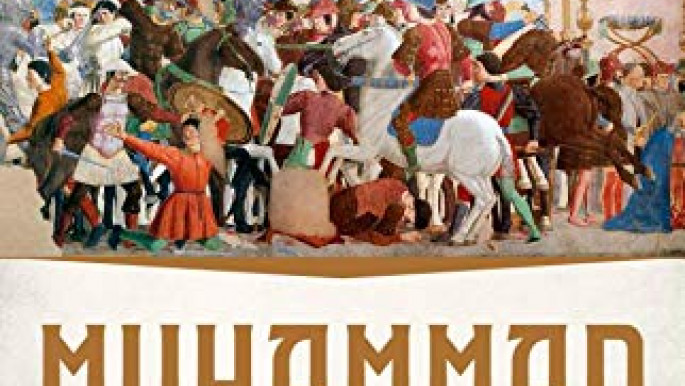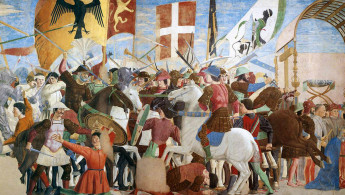Muhammad: Prophet of Peace Amid the Clash of Empires
The Byzantine world had been thrown into chaos the year before, in 602, when the Roman army led by General Phokas launched a coup against Emperor Maurikios and killed him and his family. The assassination enraged the Persian emperor Khosrow II who regarded Emperor Maurikios to be an ally and his murder to be an act of war.
The war that followed drew in troops from different parts of the world and lasted two and half decades. The war ended with the rise of a movement with a radical peace message and that movement was Islam.
The historical background and the nature of the peace message is what Juan Cole, a professor of history at the University of Michigan, set out to explore in his new book Muhammad: Prophet of Peace Amid The Clash of Empires.
Cole draws upon the Quran and contemporary records as well as the latest scholarship to historically place the Prophet Muhammad and the rise of Islam.
"I had long been struck at the importance of ideas about peace, harmony, tolerance and reconciliation in the Quran… I felt that at our historical juncture it was important to lay out a historical argument in that regard. While there is a lot of academic writing on the Quran now, it is mostly not very accessible to general readers," Cole told the publishers in an interview.
I approached the book with initial reluctance as I have taken issue with Cole's political positions and analysis of the Syrian conflict, but I was persuaded to give this book a chance on its own merits after reading G.W. Bowersock The Crucible of Islam which covered similar terrain to Cole's new book but which served more as an introduction to Islam as a movement in-between warring empires.
 |
|
The long war that ensued after the 602 coup between Persia and Byzantine was something akin to a world war for the late antiquities world, the established international order collapsed and the Near East was left battered, bruised and traumatised.
It was not the first major war to strike the region, the year of the Prophet's birth, 570 AD, a war was ranging in present-day Yemen between the Persians and Abyssinians (Ethiopians) after the Abyssinians invaded the Arabian Peninsula and attempted to seize control.
To make sense of this is to make sense of the world Islam came into, seems to be part of the argument Cole is making here.
Cole challenges aspects of Muslim tradition and contemporary Western depictions of early Islam. He does not believe the Prophet Muhammad was illiterate and argues the Quran's familiarity with Jewish and Christian scriptures as well as Greek thought, coupled together with the fact the Prophet Muhammad was a long distance trader, means he would have been fluent in literary Arabic, Aramaic and possibly Greek – contrary to what Muslim tradition claims.
However, the core of the book's argument is that the Prophet was deeply disturbed by the violence that plagued his world and how the social and political order that existed failed to prevent it. The revelations of the Quran envision an alternative society with peace as its foundation.
Early Islam was not pacifist and the Prophet did engage in warfare, but the prophetic battles were set in a particular context. This forms an integral part of the Islamic just war doctrine, namely, that only self-defence is permitted as the Prophet did not engage in warfare to conquer or dominate, but rather to defend the destruction of his community.
 |
The book argues that liberty of individual faith is at the centre of the new society, as the immortal soul hangs in the balance according to Islamic belief, thus no one should be forced to believe or disbelieve in Islam or any other religion |  |
Cole quotes from the Quran to illustrate this point, Surah al-Baqarah 2:190: "Fight in the path of God those who enter into combat against you, but do not commit aggression. God does not love aggressors."
The Quran says something intriguing and key to understanding what an alternative society looks like, Surah al-Baqarah 2:217: "Coercion of conscience is worse than warfare, for they will not stop fighting you until they turn you away from your religion, if they can."
A later verse in Surah al-Baqarah 2:256 reads: "There can be no compulsion at all in religion."
The book argues that liberty of individual faith is at the centre of the new society, as the immortal soul hangs in the balance according to Islamic belief, thus no one should be forced to believe or disbelieve in Islam or any other religion. Peace cannot exist until these rights are protected.
While I have reservations about some of the claims made in the book, Cole does succeed in contributing usefully to the public discourse on early Islam which will make for a better-informed discussion.
The book illuminates the conditions Islam arose in and gives us food-for-thought about making sense of Quranic ethics considering regional power rivalries, oppressive regimes and geopolitical fights.
Order your copy of Muhammad: Prophet of Peace Amid the Clash of Empires here.
Usman Butt is a multimedia television researcher, filmmaker and writer based in London. Usman read International Relations and Arabic Language at the University of Westminster and completed a Master of Arts in Palestine Studies at the University of Exeter.
Follow him on Twitter: @TheUsmanButt



